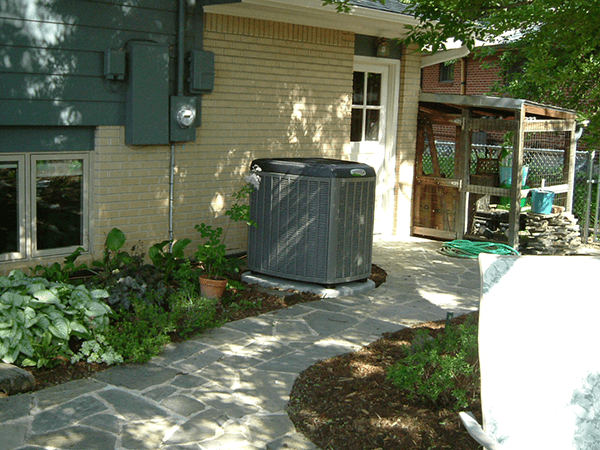Ductless vs. Central Air Conditioning – Pros and Cons
Air conditioning is oftentimes more than just a luxury. For some homes, it can be a necessity when the summer weather hits its stride. If you’re considering AC for your home you might wonder if you should opt for a ductless air conditioning system or a central system. Here is an overview of the key differences between the two.
Central AC
 A central air conditioning system uses the existing ducting system to deliver cooled air into a home through the furnace. A large air conditioner is placed outside the home — typically on the side of the building.
A central air conditioning system uses the existing ducting system to deliver cooled air into a home through the furnace. A large air conditioner is placed outside the home — typically on the side of the building.
One of the advantages of central AC is that it can cool your entire home, or at least whichever portion is connected to the ducting system, using one central system. Having only one system minimizes installation and maintenance costs. As a bonus, some higher efficiency systems may qualify for significant utility company rebates!
Bear in mind that central AC can sometimes produce uneven temperatures through the home, especially if you have a multilevel design and an older ducting system. The lower levels of the home can cool more effectively than the warmer top floor, and leaks within the system can undermine its efficiency. Advances in central air conditioner design, such as two-stage and modulating equipment, can help reduce temperature fluctuations in the home. However, these more advanced models often require the furnace to be updated at the same time. With a new, matching furnace and air conditioner system, your home can become significantly more comfortable and efficient, and often with a major reduction in operation noise. No matter which central system you choose, proper equipment sizing is critical, and bigger usually doesn’t mean better!
Ductless AC

Ductless air conditioners, also known as mini-split systems, use small AC units to provide relief from the summertime heat to any room or area of the house that you’d like to condition. A discreet refrigerant line connects each indoor unit to an outdoor compressor, or condensing unit.
Ductless systems can also provide heat, as well as cooling. These dual purpose units are called ductless heat pumps. Major design improvements in this equipment in recent years have greatly increased the effectiveness and efficiency of their heating performance. Today, a ductless system can be considered for use as a primary heat source, especially if the space is built to high energy efficiency standards.
A distinct advantage of ductless systems is their ability to provide efficient and effective zoned temperature control to each room or area where they are installed. With most centralized systems, one thermostat controls the temperature for the entire house, and all areas are heated or cooled, whether someone is using that area or not. With ductless systems, each area becomes its own comfort zone. Effective and efficient! Typically, this comes with a higher initial installation cost, but the performance advantages can’t be overstated. If comfort trumps initial installation cost, or you only need to heat or cool select areas, you should strongly consider this solution. Ductless systems, which not long ago were somewhat of a rarity in the United States, are becoming a major player in the marketplace.
Ductless systems can be an ideal solution for the areas of your home where you spend the most time, such as your bedroom or the living area.
Which Type of Air Conditioner Is Right for Your Home?
One type of air conditioning system isn’t necessarily better than the other. The one that is right for your home depends on a range of factors. If your home has existing ductwork in place, and you use all the space in your home evenly, central AC is a cost effective and practical choice. It’s an option still used by the majority of homeowners. An expert consultation will help you select the appropriate size and model for your home and budget. Whether you update your furnace at the same time may depend on how long you plan to remain in the home, and whether improving overall comfort in your home is an important goal. The rebate opportunities a matched system might create may also be worth considering.
On the other hand, if your home does not have a central ducting system (for instance, hot water baseboard or radiant floor heat), it may be difficult or impossible to install the needed ductwork for a central system. In such cases, ductless is a great way to go. Ductless systems are also perfect if you only want to improve the cooling or heating in certain areas of your home.
Both central and ductless AC systems come with distinct advantages. Talk to an expert who can offer you the guidance you need to decide which one is right for your home and your circumstances.




